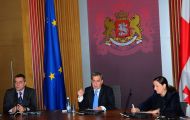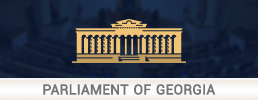.jpg&im_new_w=190) On December 30, 2010, Prime Minister of Georgia, Nika Gilauri, met with journalists at the Government Chancellery and summed up the results of the year 2010. Below, we present the Prime Minister's speech:
On December 30, 2010, Prime Minister of Georgia, Nika Gilauri, met with journalists at the Government Chancellery and summed up the results of the year 2010. Below, we present the Prime Minister's speech:
"Good day, everybody.
First of all, I would like to congratulate you and the entire Georgia with the upcoming year 2011. I wish you success and good health; I wish the entire Georgia unity and progress. Today I would like to sum up the year 2010. I will first touch political developments, but today's meeting will mainly be devoted to the economy. Afterwards I will try to answer all of your questions.
Let me start by saying a few words about politics and pointing out the main important events of 2010. First of all, I would like to emphasize the local government elections which were held particularly well. All the international experts acknowledged that they were free and fair. The Parliament adopted a new Constitution, which was very important, and all the experts have acknowledged that this Constitution is much more progressive and closer to the European Constitution. Despite Russia's attempts to isolate Georgia on the international arena, they failed to do so. On the contrary, in 2010 Georgia was one of the main topics in international politics. A lot of things have happened in 2010 - a meeting between Presidents Saakashvili and Obama, and a meeting in the framework of the Charter which was co-chaired by Hillary Clinton and me. A lot of steps were taken during this period, and Georgia, on the contrary, found itself at the center of international politics. At the NATO summit that was held in Lisbon, NATO's support for Georgia was emphasized.
All this has also had a positive influence on the economy, because a positive political situation automatically leads to a stable economy. What do I mean with this? At the beginning of the year, the IMF, Georgian experts, the Ministry of Finance, the Ministry of Economy and I debated about what the economic growth figure would be in 2010. The opinions varied between 1.5% and 2.5%. We agreed that there would be a 2% growth, and included a 2% growth figure in the first version of the budget. The year has passed, and we see that it is ending with a 6% economic growth. The figure for the first three quarters was 6.5%, and we have had very good figures in November and December. Presumably, the economic growth in 2010 will be higher than 6%, it may even reach 6.5%. This is a very positive figure. I can tell you that I have looked at the figures of other countries both in the post-Soviet space and Europe together with the IMF experts, and Turkey is the only country in our neighborhood which has as high economic growth as we do.
What was the driving force of this growth and economic activity? Was it any concrete field? In some countries, the driving force is oil. As the price of oil goes up, the economy of these countries also goes up, and when the oil price goes down, the economy also goes down. What was the main driving force behind Georgia's economic growth? There are several important factors. The first and most noteworthy is perhaps export. Exports have grown by 35% compared to last year, and it is one of the most important figures. Not only exports for some concrete field or product have grown, but the total sum of exports has risen. The number of countries to which we export goods has increased. Accordingly, the current account deficit has decreased from 12.1% to 11%. In other words, money outflows from the country were higher than money inflows, and the negative difference was higher than it is this year. This year, we have one of the lowest figures of negative difference, which is very important. In other words, more money flows into the country, we export more goods, we have more tourists, and more investment projects are carried out. This is the meaning of the figures that I presented.
What else do I mean under export? Export of agricultural products. This is very important. Fifty percent of our population lives in the countryside, and it is very important to increase the export of agricultural products in order to increase employment and the income of these families. Exports of agricultural products have increased by 25%, and wine exports have increased by almost 50%, which is also a very important figure.
In connection with exports, we should also mention the energy sector. Energy has been one of the main driving forces that have moved Georgia's economy forward. In 2010, Georgia has started building five new dams. I can think of no other country which has started building five new dams this year. Also, this year we have started the construction of high-voltage power lines that will connect Georgia and Turkey. This is the precondition that we will have quite high direct investments in the energy sector and a lot of people will be employed on the construction sites. We have also reached a record figure for energy exports - we exported 1,300,000,000 kilowatt hours, which is record high. I would like to emphasize that we export energy to all our neighboring countries. We export electric energy to Russia, Azerbaijan, Armenia and Turkey. We are exporters. We have agreements on exchange, which means that we export in summer and import in winter. In sum, we end up being exporters in relation to all of these countries, which means we give more than we receive.
It should be mentioned that more than 80% of our electric energy balance is hydro energy, which makes us less dependent on natural gas. We buy zero amount of gas from Gazprom. We pass Gazprom's gas to Armenia and get a transit tax in the form of gas. Today Gazprom owes us several million cubic meters. From the viewpoint of energy, we are one of the most sustainable countries in this region, and it's very good that all this is diversified - there are three different pipelines from which we receive gas. Approximately 1% of oil consumed in the world passes through Georgia as transit - from Azerbaijan to the Black Sea and from Azerbaijan to Turkey (through the Baku-Tbilisi-Ceyhan pipeline). Energy has played quite a big role both in exports and economic growth, and next year it will play an even bigger role, because we have concluded 40 different memoranda on the construction of dams, the construction of 40 new dams, out of which five will definitely start next year. Five have started this year, and five more will start next year. The biggest of the dams whose construction started this year has a generating capacity of 78 megawatts, and the smallest has a capacity of 6 megawatts. Almost all the dams whose construction starts next year will have a capacity of more than 100 megawatts. In this sector, more investments will be attracted and more people will be employed.
Tourism has also been one of the main driving forces behind our country's economy. We didn't expect such growth. The number of visitors has increased by 38-39% compared to last year. The main part of visitors are citizens of Azerbaijan, Armenia and Turkey. Their figures are equal - 26% of the total number of visitors are from Azerbaijan, 26% are from Turkey, and 21% are from Armenia. Tourism has also contributed much to the growth of the country's economy, because these sums are brought from abroad that remain in the country - they go to small entrepreneurs and owners of restaurants, bars and cafes. It should be emphasized that in 2009-2010, the construction of four big hotels started in Batumi; some of them are still under way and others have been completed. I can think of no other city with a similar size where Sheraton, Raddison, Kempinski and Hilton start or finish construction simultaneously, which took place in Batumi in 2009-2010.
In 2010, we have announced the formation of the Kobuleti Free Tourist Zone with much success. Thirty bids have been submitted. We have already signed contracts with ten bidders, and the construction of seven hotels has started. As for Anaklia, the same was declared here, but there has been less interest, and only four companies have submitted bids. However, it is still early to sum up the results, because the deadline for the private sector to submit bids for the Free Tourist Zone is the end of January.
The banking sector has also been important for the country. The Georgian banking sector today has record-high deposits and a record-high loan portfolio. In none of the years starting from the 1990s has the banking sector had such high deposits and such a big loan portfolio. The deposits have grown by 34%, and the credit resource has increased by 15.6%. We have an aggregate growth of the banking sector, which is also very important for the growth of the country's economy.
Registration of vehicles and real estate has also increased. But I would say that the real estate market is the only market that hasn't developed so far and hasn't caught up with the rest of the economy. However, growth has also been observed in this area - there is a 20% increase in the registration of both vehicles and real estate compared to last year. Vehicle registration is increasing further and becoming a very successful area. Vehicle export is becoming one of the main exports in Georgia today. Large companies - Toyota and other Japanese companies - have chosen Georgia as a hub. They bring and store vehicles here, and then sell them from here to Azerbaijan, Armenia and Kazakhstan, not only to the Caucasus, but also to the countries of Central Asia. The country has turned into not only an energy hub, but also a trade and tourism hub, the center and tourism hub of the region. We see this and consider it as success. Important steps have been taken in order to make this country the energy, tourism and trade center of the entire region.
In 2009, the budget deficit was 9.2%, which served to stimulate the economy by putting more money in the economy than was taken from the economy, even at the expense of an attracted loan. We have decreased the budget deficit from 9.2% to 7.4%, and then it decreased and came down to 6%. This means that we have decreased budget deficit by 3.5% in a year, which is a record figure. Next year, we are planning to bring this figure down to 4.3%. The loans we have taken are long-term concessional loans. For example, if we compared Georgia's external debt to the GDP, it amounts to 38%. This is not so high a figure; according to the Maastricht Criteria, 60% is an acceptable figure. It should be noted that this 38% mainly consists of long-tern, low-interest concessional loans. These are not expensive loans. They are loans from the World Bank, the Asian Development Bank, the EBRD and such institutions.
There are several directions which I would like to see in a better condition. First of all, I mean foreign direct investments whose sum of the first three quarters amounts $433 million, which is not a high figure. We don't have the figures of the fourth quarter, but according to the first three quarters, such investments are not very high, and I would like them to be higher. What have we done to balance this? We haven't created any macroeconomic problems and we have attracted a great number of infrastructural projects from international financial organizations. The MCC highway has been completed this year, which is quite a big, more than a $200 million investment. The Samtskhe-Javakheti highway and Gombori highway were completed, and the construction of the East-West highway, the Mestia highway, and the 500 kilowatt power line still continues. All of these large infrastructural projects were financed with external funds. Accordingly, international inflows in the country were not low, despite the fact that private inflows were not so high. We have balanced the lack of FDIs by attracting large sums from international financial institutions during this period: partly grants and partly long-term credits. Another figure which I would like to be better is the inflation rate. According to the figures of 11 months, inflation reaches 10.5%. This reflects negatively on the population. It's especially noteworthy that inflation and price hikes affect items of primary consumption - food products. This is caused by the international inflation pressure which is observed in the entire region and around the world and which we cannot avoid and escape. We have made several concrete decisions to alleviate the problem of price hikes for the population. We are also planning long-term projects, such as the program of replacing the imported agricultural products with local products. We have brought special varieties of wheat and maize which yield more crops per hectare.
These are the two main figures which I would like to be better: foreign direct investments and inflation rate.
We can say that privatization and the healthcare sector have improved compared to last year. Last year, the process of privatization failed, and it was one of our biggest problems. This year, the plan for privatization which was GEL 150 million has been fulfilled. The plan for the budget has also been fulfilled.
The healthcare sector is developing well. Last year, we planned quite a large-scale reform, and this reform is being carried out this year. The reform includes building 46 new hospitals/clinics in our districts and regions. The state is building and repairing different facilities and buildings for 21 clinics in Tbilisi. The private sector is also implementing other projects. By the end of the next year, we will have a different infrastructure in the field of healthcare. It should be mentioned that we made a decision according to which at the end of 2011, no hospital will be allowed to operate with the same standards they are operating with today, or with the standards that are entirely incompatible with international standards. The international standards have been formulated, and at the end of 2011, the aforementioned standards will become functional.
By the end of next year, we will have at least 80-85 new clinics in the entire Georgia. In every district center a new clinic is being built. It is very important that they are built by the private sector, because it will take better care of the new hospitals. In Digomi, we are repairing the Railway Hospital and Zhvania Hospital, and we will move up to 21 different hospitals and clinics of Tbilisi that have to operate under very poor condition to these newly repaired buildings, and they will be privatized by the staff and the companies. The state will retain several directions in healthcare: tuberculosis, AIDS, infectious diseases, and psychiatry. We are acting as moderators between the hospitals, the population and insurance companies. There is discontent between these three sides. For this reason, it is necessary that the mediator is much stricter and more demanding. We are working on this, and next year, we will see the moderator in a stricter and better role.
In 2010, a lot of reforms have been carried out in the field of education. The reform of Mandaturis is very important for parents to feel that their children are safe when they go to school.
In the schools in which we have introduced Mandaturis, crime rate has decreased by 80%. The project of 1,000 foreign teachers is a very important project, as is the teacher certification program which we started this year. This project is very important to increase teachers' qualifications above the present level. This is the future of education - in order for children to have a future, teachers must be highly qualified. This program will definitely continue next year.
The New Economic Course which the President promulgated a few weeks ago is an important reform. The New Course deals with the Revenue Service. Up to now, we were implementing a reform of the Revenue Service and the Ministry of Finance. A lot of things have been done, but at the same time, we felt that the private sector was concerned and worried about stricter administration than it had expected. For this reason, we announced the New Course. In two days, a new Tax Code, which is more liberal and suited to the private sector, takes effect.
I was personally involved in working on the new Tax Code together with the private sector. For quite a long time, representatives of the private sector worked together with my advisors and those of the Ministry of Finance; they came up to my office and we discussed each and every article of the Tax Code. The new Tax Code was written with a direct participation of the private sector.
The Tax Code takes effect from January 1. The infrastructure of the Ministry of Finance has been improved, rehabilitated and built almost completely. Only the Sarpi Customs Check Point remains to be rehabilitated, which will be completed in May next year. This is a completely new approach. The Revenue Service should serve the private sector, and we are moving toward this approach. A lot of positive changes were made to the Tax Code, which will help the private sector and increase its trust toward the Ministry of Finance.
 Finally, I would like to touch upon ratings - the Transparency International Global Corruption Barometer and the Doing Business rating. I will also mention the ratings of Fitch and Moody's. In Doing Business, it is noteworthy that we remain the only country among the East European countries and in the post-Soviet space that is included in the top 15. We were named as number one reformer in the years 2005-2010. We are at the 12th place and have the opportunity to be included in the top ten next year.
Finally, I would like to touch upon ratings - the Transparency International Global Corruption Barometer and the Doing Business rating. I will also mention the ratings of Fitch and Moody's. In Doing Business, it is noteworthy that we remain the only country among the East European countries and in the post-Soviet space that is included in the top 15. We were named as number one reformer in the years 2005-2010. We are at the 12th place and have the opportunity to be included in the top ten next year.
That we are above Germany or some other European country in this rating doesn't mean that our economy is more developed than that of Germany. What it means is that if we have long-term stability and pursue the same approach, our economy has a chance of catching up with European countres and developing like they have done. A businessman who works in Georgia has a more simplified environment than there is in many countries of Western or Eastern Europe.
As for the Global Corruption Barometer, in many countries, the population was surveyed and asked the same question: Have you or a member of your family paid a bribe in the previous 12 months? In the European Union, this question was answered positively by 5%, in the US - by 5%, and in Georgia - by 3%. Only a few European countries, the Scandinavian countries and South Korea have better figures than we do. It is one of the most important achievements in the recent years that Georgia is included in the top ten of the countries where the level of corruption is the lowest. Moody's was the first to asses Georgia and to move us one step above. While we had a rating of B+ in the Fitch ratings, Moody's gave us a BB rating, which is one step above. We are expecting the assessment of other agencies and assuming that they will also increase our rating.
The increase of these ratings means that the international community trusts us more, which is a precondition of more investments and of attracting loans more cheaply."
Prime Minister's Press Service











